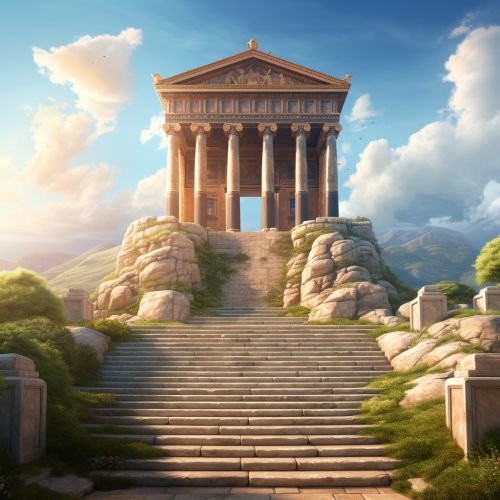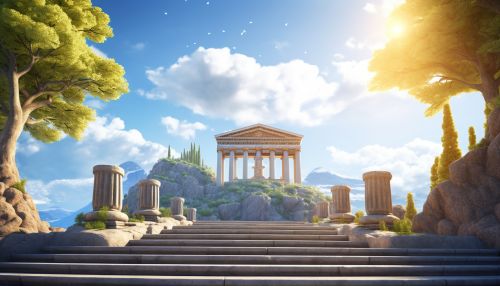Ancient Greek religion
Origins and Historical Overview
The Ancient Greek religion was a polytheistic, anthropomorphic system of beliefs and practices followed by the ancient Greeks. The religion was centered around a pantheon of gods and goddesses, each with their own distinct personalities, domains, and stories. The ancient Greeks believed in the existence of many gods and goddesses, each of whom had a specific area of influence. The most important deities were the twelve Olympians, who were led by ZeusZeus.


The origins of Ancient Greek religion can be traced back to the Mycenaean civilizationMycenaean civilization, which was influenced by the earlier Minoan cultureMinoan culture. The Mycenaeans adopted many of the religious beliefs and practices of the Minoans, including the worship of earth goddesses and sky gods. The Mycenaean period was followed by the Dark Ages, during which many of the old religious practices were lost or transformed.
The Classical period of Ancient Greece, which lasted from the 5th to the 4th century BCE, saw the development of a more structured and organized religion. This period was characterized by the establishment of temples, sanctuaries, and festivals dedicated to the gods. The religion was deeply intertwined with every aspect of Greek life, including politics, warfare, and social interactions.
Beliefs and Practices
The Ancient Greeks believed in a cosmos where the gods were supreme and humans were at their mercy. They believed that the gods controlled all aspects of the natural world and human life, including the weather, harvests, and the outcome of wars. The gods were thought to be immortal, but they had human-like characteristics and emotions. They could be jealous, vengeful, or benevolent, depending on their mood or the actions of humans.
The Greeks worshipped their gods through rituals, sacrifices, and festivals. They built temples and sanctuaries where they could perform these rituals and communicate with the gods. The rituals often involved the sacrifice of animals, such as bulls or goats, which were thought to please the gods and ensure their favor. Festivals were held throughout the year to honor specific gods and goddesses, and they often involved music, dancing, athletic competitions, and feasting.
Gods and Goddesses
The pantheon of Ancient Greek gods and goddesses was vast and complex. The most important deities were the twelve Olympians, who were led by Zeus, the king of the gods. Other major deities included Hera, Poseidon, Demeter, Athena, Apollo, Artemis, Ares, Aphrodite, Hephaestus, Hermes, and Dionysus. Each god or goddess had a specific domain or area of influence. For example, Poseidon was the god of the sea, while Athena was the goddess of wisdom and warfare.
In addition to the Olympians, there were many other gods and goddesses, as well as a host of minor deities, spirits, and mythical creatures. These included the nymphs, satyrs, centaurs, and the Fates, who were believed to control the destiny of humans.
Cults and Mysteries
In addition to the public worship of the gods, there were also private religious groups, or cults, that worshipped specific deities or practiced secret rituals. These cults often revolved around a particular god or goddess, or a specific aspect of life or death.
One of the most famous of these was the Eleusinian MysteriesEleusinian Mysteries, which were dedicated to Demeter and her daughter Persephone. The mysteries were held annually and involved a series of secret rituals and ceremonies that were believed to ensure a good harvest and a blessed afterlife.
Another important cult was the Orphic cultOrphic cult, which was based on the teachings and songs of the mythical poet Orpheus. The Orphics believed in the transmigration of souls and the possibility of achieving eternal bliss through a life of purity and asceticism.
Impact and Legacy
The Ancient Greek religion had a profound impact on the development of Greek culture and civilization. It influenced Greek art, literature, philosophy, and politics, and it played a crucial role in shaping Greek identity and worldview.
The religion also had a lasting impact on Western civilization. Many of the myths, stories, and concepts of the Ancient Greek religion were adopted by the Romans and later incorporated into Christianity. The influence of the Greek gods and goddesses can still be seen today in Western art, literature, and popular culture.
